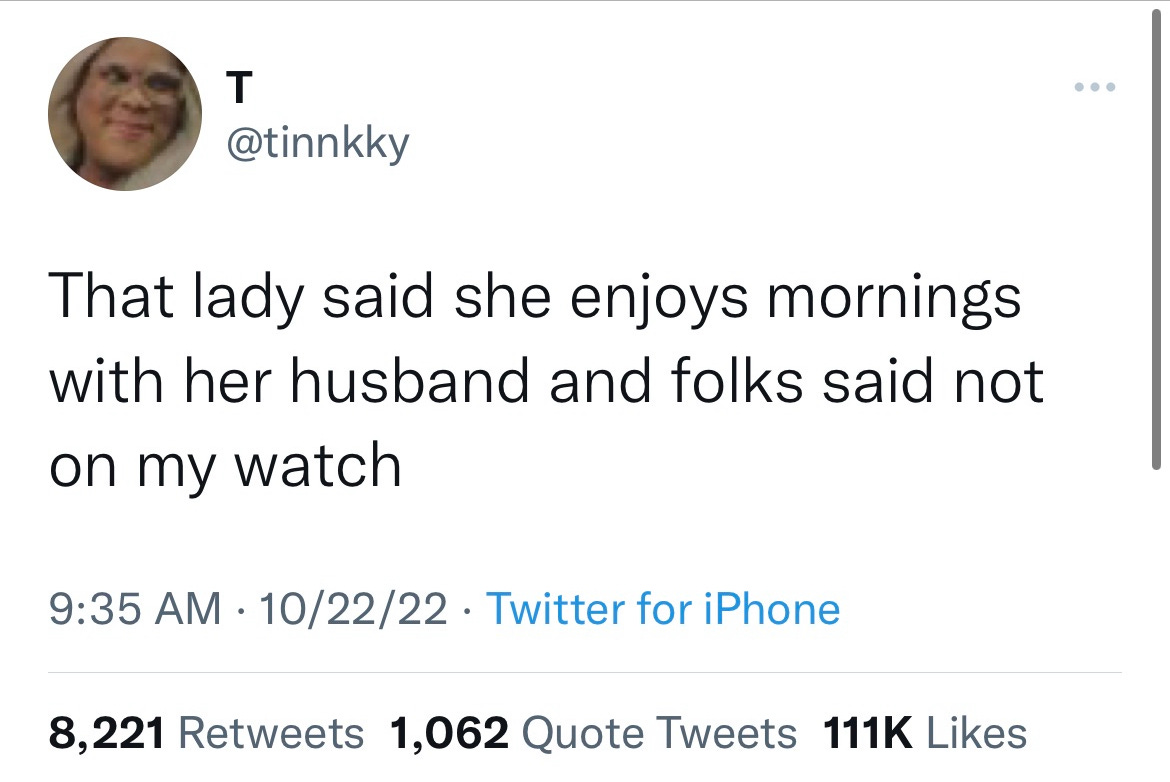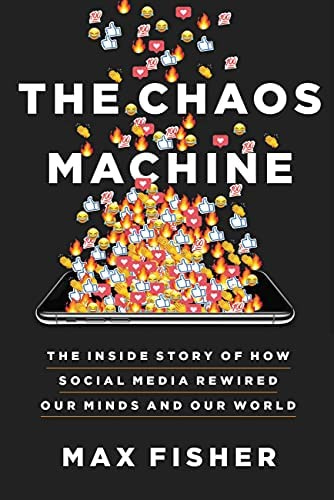In March 2020, when updates and predictions about “the new virus” were churned out every minute, I turned to Twitter. I’d had an account for years, but this was the first time I actually used it.
And if you don’t know, Twitter is a hilarious, scary, witty, snarky, absurd place on the internet. It is a favorite haunt for many writers, who already write one-liners in their sleep. And for comics, for whom every tweet is a punchline. And for pundits, who prefer hot takes with zero sources or explanation.
And all these types of people—writers, comics, and pundits—traditionally skew a little mean.
Anyway, I got sucked in for a few months, until we started realizing no one was imminently going to announce the pandemic’s official end. During those months, I absorbed a bit of Twitter’s culture, something that had previously eluded me. And while I did witness much vicious backbiting, I also found it incredibly funny.
Exhibit A.

I mean, who doesn’t love the payoff of a mini-joke when the buy-in is just 12 seconds of reading time? And these are harmless, lovable examples.
As I dug deeper, I understood why Twitter is consistently the frontier of modern language development. It’s the place where slang is invented and spreads, where sayings and memes proliferate, and where alllll the jokes are inside jokes. Tweets are crafted in a way (without punctuation or capitals or any of the agreed-upon mechanics) that makes them seem haphazard and easy, as if dashed out on-the-go.1 Of course most of these tweets have been rewritten and reconsidered a hundred times, but the ostensibly casual nature of the language creates the culture of the place and, later, the culture for all the rest of us. And for reasons I can’t totally explain, the absence of periods at the end of most tweet sentences is part of what makes them so funny. (They have the cliffhanger quality of a good joke, perhaps? Or they are made to seem almost accidental in their humor?)
None of this is really the point. I’m sure lots of nerdy linguistic types worry our language is being corrupted by what happens on Twitter, but as a person who has taken and passed Old English and History of the English Language, I can definitively tell you not to worry about that.2 Languages change, and a former iteration is not morally superior to a later one, regardless of how loudly Olds bemoan the changes.
However. One thing does worry me about the language of Twitter. (It’s actually a problem on the whole internet, but Twitter is like a cultural petri dish.) It’s that users avoid, almost at all costs, earnestness.
Earnestness is defined as “sincere and intense conviction.” On Twitter, no one is saying how great their day is, how much they love their president, how happy they are to be alive.
What, then, replaces earnestness? Irony, satire, and snark.
A few weeks ago, Twitter served up a striking example of this. The original poster (OP), apparently ignorant of the “rules,” casually typed up a simple accounting of mornings with her husband.
For the sole reason that she was insufficiently angry, bitter, or sarcastic, her tweet—this silly little tweet!—went extremely viral.
Almost all the initial responses were negative. People called out her privilege (mornings off? must be rich!) and generally roasted her for nothing more than being so unabashedly, embarrassingly earnest.3
I think I’ve said before that sarcasm is my love language. If the cocktail napkins, tea towels, and greeting cards sold at my local bookstore are any indication, most word/literary types enjoy puns and snark and irony and all the other funny things you can do with words4 (like, maybe, swearing?). This is why I find Twitter hilarious.
But I try hard to direct my eye rolls at the culture-at-large, broken systems, or myself. Snarking at a woman for having coffee with her husband is just—bizarrely—mean.
So I don’t worry that emojis are turning us into cavemen, and I don’t worry that snark is turning us into actual meanies. (Much ink has been spilled on these topics, but I’d argue Twitter meanies are meanies IRL and not the other way around. … And then I’d argue that IRL meanies are really just sad. But I digress.)
I do worry a culture of snark makes it awfully hard for nice people to be nice and good people to be good. Or even for sarcastic people to be sometimes earnest. Or for sometimes-mean people to be occasionally nice. On Twitter, as on much of the internet, earnest folks are eaten. alive.
A cliche in craft classes for writers is “avoid sentimentality,” loosely defined in this context as exaggerated or self-indulgent emotion. For this reason writers tend to avoid words like "heart” and “home” and “love,” words that might come off hokey. And while this is absolutely good writing advice (take us to the emotion another way, ideally using concrete images instead of abstractions, and your reader will trust you are not taking an unearned shortcut to their feels)—it’s worth noting that what is considered “sentimental” now wasn’t a hundred years ago.5
Also, people don’t resist strong emotion or sincerity when it is held in tension (that word again!) with grittier realities. Again, we don’t like to feel manipulated, and whether it’s a Christmas card or a poem, it must reflect the larger truth that life is not merely incredible!! or awful!! but a little bit of both. Unless you are a person who lies to herself about the way the world works, you will feel lied to by, say, a poem that embraces one extreme to the exclusion of the other.
Last year I taught creative writing to gifted high school students. The last time I officially taught creative writing (to college kids) was a decade earlier. I immediately noticed a seismic shift had occurred in those ten years: now, detachment is cool, sincerity is lame.
And I don’t mean the kind of careful detachment that keeps writers from stumbling into corniness or melodrama. I mean detachment from everything.
The vibe could be summed up in a single idea: love nothing.
These days, loving things is uncool.
Belief is uncool.
Hope is uncool.
I don’t blame Twitter, but I do blame the internet, which was literally built around angsty bro-culture, “creating an alternate reality defined by conspiracy and rage.”6
That good writing advice (avoid over-the-top, mawkish sincerity) has been warped by our collective irony. Now we avoid sincerity entirely.7
One day early in the semester at the high school, I made some sarcastic remark (that I’d like to remember as incredibly funny because no one can prove that it was not). And one of my beloved students explained her shock and relief, claiming, “We thought you were one of those live-laugh-love types.”
I died.
Being a live-laugh-love person is the ultimate insult among the 2022 youths. It is a person with glossy Instagram photos and well-coiffed children and absolutely no understanding of what might be wrong or hard at any place other than her local Starbucks. And also she has this sign above her neatly-made bed.
It is internet shorthand for sentimentality, as exemplified in one of my favorite tweets of all time.

A live-laugh-love person is a person with blinders on. So no, I don’t want to be a person who carelessly throws around phrases like “y’all love everybody!” when love is not always what is called for.8 Sometimes what is called for is a critical lens and a call to accountability. Sometimes that’s reality.
But at the other extreme (and this is the water in which these students swim) is Twitter, where snark is the native language. And the Twitterverse is not a place any of us want to permanently reside—trust me. Sometimes we have to be able to say we love coffee mornings with our husbands because sometimes that’s reality.
And—no matter what else is wrong in the world—we have to be able to share the moments when and where love is reality. When and where hope is reality.
Because saying it makes it so.
This despite the fact that the people writing them are often very (very) smart.
This is sarcasm.
If this seems in conflict with the post I just wrote about Christmas cards, read further.
Dickens.
Surprise! Binary thinking is easier.
If you pushed me on this, I’d say love is always called for. But love doesn’t mean sweeping something under the rug, which is the implication here. That’s a cultural problem with the word “love,” not a problem with Love itself.














"'Wow,' said [Ginger]. That was just about all she could say. 'Wow.'" -Lilly's Purple Plastic Purse, by Kevin Henkes
I was at a men’s group at church this morning and we’ve been having earnest conversations once a month. I think you’re right that earnestness is so rare, but it’s perhaps the foundation for deep friendship. When writers share personally and genuinely, it seems counter cultural, but I’m drawn to it. I’d love for you to be super earnest about something in your next newsletter!